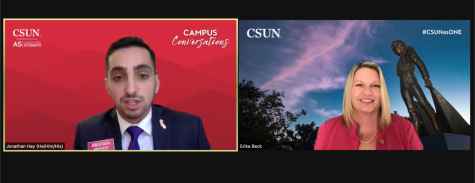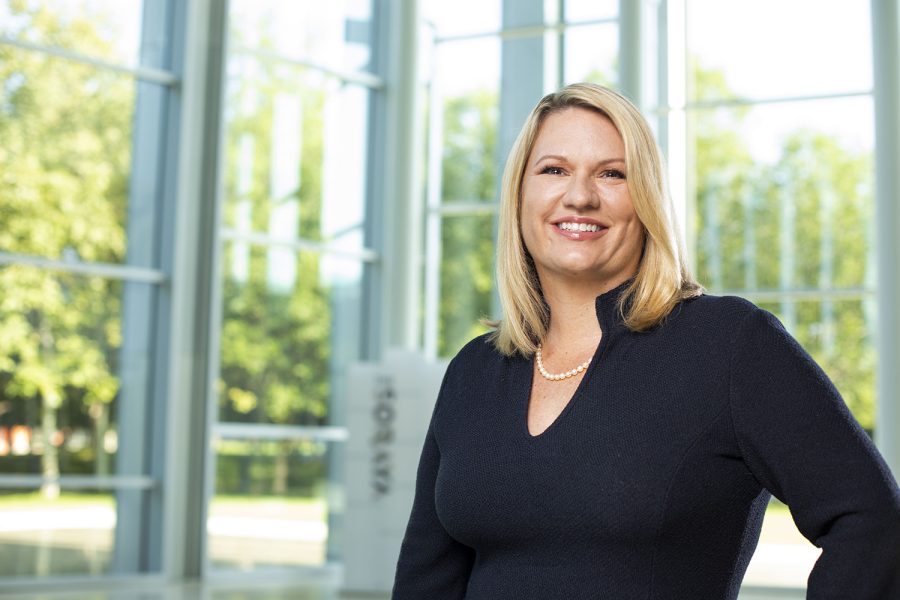President Beck addresses questions on in-person commencement during first Campus Conversation
California State University President Erika D. Beck,Ph.D. is photographed at the Younes and Soraya Nazarian Center for the Performing Arts on the CSUN Campus on July 27, 2021. “What drew me to CSUN was the diversity of the students at this campus. There is really nothing like it,” Beck said.
October 12, 2021
During the first Campus Conversation of the semester via Zoom on Sept. 30, CSUN President Erika D. Beck spoke with Associated Students President Jonathan Hay about CSUN’s efforts toward educational equity and providing a better experience for the campus community.
The event also included a Q&A session, where participants could send their questions for Beck to answer. These campus conversations are crucial for understanding how to better serve students, according to Hay.
On the recent funding CSUN has received
Campus Conversation also served as a platform for Beck to talk about the projects that are going on to help progress equity across the university. She discussed the forthcoming Global Hispanic Serving Institution Equity Innovation Hub. The HSI Equity Innovation Hub will help build “educational pathways” for more equitable success in the STEM field, as well as transform success for Latnix students, according to Beck. The hub was a result of the recent $25 million donation from Apple and the $25 million allocation in the 2021-22 California state budget.
Beck mentioned that the $40 million dollar gift from Mackenzie Scott and Dan Jewett will be used to contract “outside consultants,” who will look at university policing practices with an equity lens.
According to Vice President of Student Affairs William Watkins, these changes in policing at CSUN began to take shape in the wake of George Floyd’s murder. Additionally, different “equity, inclusion, and social justice consultants” were chosen to look at the university policing practices.
PMJ Consulting is conducting this process, and is using focus groups with “traditionally marginalized and minoritized groups,” according to a statement from Watkins. There will also be open forums that will be available in November. Once everything is completed, the final cost will be provided.

Additionally, the couples’ philanthropy will be used to hire more diverse staff and develop identity resource-based centers, to further push equity.
Provost Mary Beth Walker will also lead a road mapping process that will outline the top priorities for the university, in which Beck encourages the community to participate.
During the Q&A, Beck received a question on how the school will plan on diversifying its faculty into one that will represent the student population. She said that CSUN made an effort to hire and retain more diverse faculty in different ways during the last semester. One method was by assigning two equity faculty advocates, both of whom are faculty members.
In addition, the administration is launching a multi-pronged approach that includes changing how they hire faculty and train search committees and an ongoing commitment to equity. Secondly, the administration is adopting reporting and analytical tools to help clarify what works and what doesn’t. Beck stressed the importance of equity not ending once new faculty members are hired. She said she wants them to thrive and stay at CSUN.
Resuming on-campus activities and events
Another question raised was regarding student organizations, and if the organizations can anticipate a return to campus next spring. It is Beck’s hope that on-campus activities and meetings can return next semester without a limit on attendees, and with fewer restrictions.
She said there are different factors that play into this, including the Los Angeles County protocols that the university must follow. The Matador Involvement Center, in collaboration with the vice president’s office, will meet during winter break to discuss how to safely conduct in-person meetings next semester with proper protocols.
In terms of commencement, Beck looks forward to having an in-person event if it can be done safely. The university plans on making commencement announcements in January 2022, with plans to include both the classes of 2020 and 2021.
Supporting transfer students and student parents
Based on conversations Hay had with students and some of the questions for Beck, Hay wanted to touch on both transfer students and student parents. He admitted that AS hasn’t done a good job including these students into the university’s conversations, and Beck was asked what work is being done for transfer students.
Beck said that transfer pathways are crucial for the goal of equity, and this is being addressed with things like timely graduation, credit loss, and reevaluating financial aid policies that aren’t fair to transfer students. She stated that some colleges have developed curriculum gateways designed with the idea to engage new transfer students into the major of their choice. This includes special advising and welcome events for students and their families.
Additionally, admissions and records will redesign their outreach to prospective students to better serve the needs of transfer students. Another available resource is the Transfer Student Alliance, which is an organization of CSUN transfer students that wants to create a strong support system for new, existing and incoming transfer students, according to their website.
Beck believes that it’s important to link these individual resources together so that transfer students know about them, and that their needs are being met. She also stated that transfer and non-traditional students indicated a desire to build a sense of community outside of class.
Beck discussed the resources that are available to students that are parents. These include child care via the AS Children’s Center, a parenting support group through University Counseling Services; lactation accommodations on different parts of campus; and access to the Family Focus Resource Center for children with special needs. Family housing is also available at University Hall. She said that these programs are flexible to accommodate beyond “a 9-to-5 schedule.”
Beck said that students have mentioned to her that many of them are benefiting from virtual programming that was not available prior to the pandemic, making these services much more accessible. With this in mind, Beck stated that the university is looking into which services could be kept within a virtual environment.
For the final question, Beck was asked how the university plans on tackling and bridging the equity gap that currently exists. She defined the equity gap as white students who graduate at higher rates than their non-white peers. She said that CSUN needs to understand why these inequity gaps exist and eliminate them.


